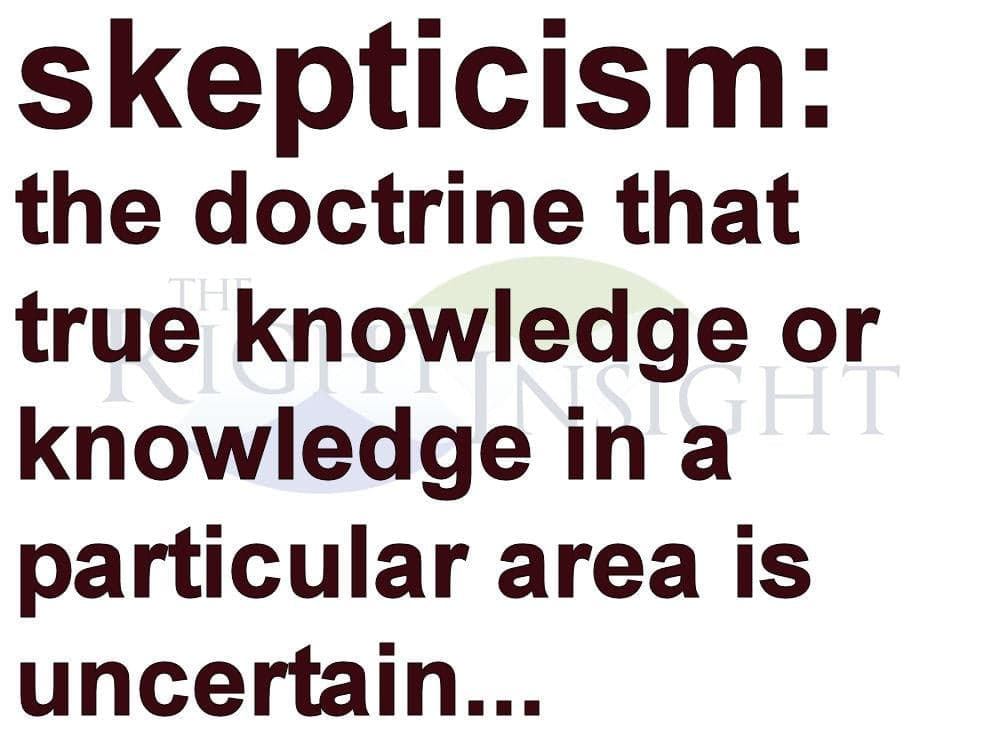The word “denial” has several different definitions depending on the context in which it is used. In the psychological context, it is defined as: “a defense mechanism in which confrontation with a personal problem or with reality is avoided by denying the existence of the problem or reality”. The word “skepticism” also has several definitions depending on the context. In the context of climate change, it is defined as: “the doctrine that true knowledge or knowledge in a particular area is uncertain; or, the method of suspended judgment, systematic doubt, or criticism characteristic of skeptics.
Many in the consensed climate science community and their political and media enablers choose to use the terms “denial”, “denier”, “denialist”, etc. when referring to those who are skeptical of elements of the “scientific consensus” regarding catastrophic anthropogenic climate change. This choice is intended to suggest a commonality with denial of the occurrence of the “Holocaust”, one of the best documented atrocities in human history. The specific intent is to suggest that the consensus position on climate change is an established “fact”, just as the existence of the “Holocaust” is an established fact; and, that failure to accept the consensus position as established fact is as unreasonable as denying the existence of the “Holocaust”. That suggestion is “A Bridge Too Far”.
One interesting recent development is the establishment of the Centre for Studies of Climate Change Denialism (CEFORCED) at Chalmers University of Technology in Sweden. The Centre has undertaken a study: ““Why don’t we take climate change seriously? A study of climate change denial”. The study focuses on “the ideas and interests behind climate change denial, with a particular focus on right-wing nationalism, extractive industries, and conservative think tanks.”
The use of the term “denialism”, as opposed to skepticism, is intended to suggest that “the existence of the problem or reality” is being denied; and, that this “denialism” is, a priori, unreasonable. While the Centre name includes “Climate Change”, it is actually intended to study “denialism” of the consensus position on catastrophic anthropogenic climate change. Climate change is a historical fact, clearly and comprehensively documented in the palaeoclimatological record. There are very few if any educated individuals who deny, or are even skeptical of, this historical fact.
The Centre might, instead, have used “Anthropogenic Climate Change” in its name, but there are relatively few who deny the existence of a human contribution to recent global warming, though many are skeptical of the extent of the human influence and of the warming. The Centre might also have used “Catastrophic Anthropogenic Climate Change” in its name, thus focusing on the real source of most current climate change skepticism. However, CAGW (Catastrophic Anthropogenic Global Warming) is hardly “fact” or “reality”, as there is no documentation that it is happening or will happen. Rather it is a creation of unverified climate models using uncertain climate sensitivities, forcings and feedbacks.
It might be interesting to contemplate the possibility of a Center for Studies of Catastrophic Anthropogenic Climate Alarmism (CECACA). This Centre might focus on the influences of left-wing globalism, renewable energy industries, left-wing think tanks, non-governmental organizations, re-distributional socialism and advocacy of global governance. Such a Centre might well focus its initial studies on following the money, of which there is a veritable river flowing from multiple sources and down the rat hole.
